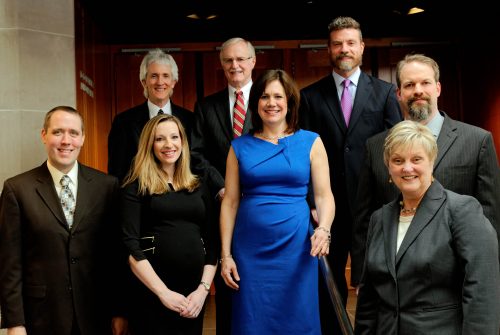
Members of the Department of Music Teaching and Learning (formerly Music Education Department) are, standing, front right: Donna Brink Fox; first row, from left: Alden Snell, Elizabeth Bucura, Ann Marie Stanley, John Fetter; second row, from left: Christopher Azzara, Richard Grunow, Philip Silvey. Photo by Gerry Szymanski
The Eastman School of Music is proud to announce the newly named Department of Music Teaching and Learning (formerly Music Education Department). The name of the department has changed over the years to reflect the evolution of American music education. Prior to the 1960s, students earned degrees in Public School Music, which was the prevalent career path at that time for music educators. Reflecting the expanding role of the department, and in compliance with other music schools in America, Public School Music became the Music Education Department in the late 1960s.
Changing the name to the Department of Music Teaching and Learning aligns with terminology present in the profession at large for more than two decades; addresses the needs of contemporary society; and reflects more explicitly the mission of the department and the breadth and depth of its offerings. Christopher Azzara, Chair and Professor of Music Education, states that Eastman students study music teaching and learning processes that occur in many settings and various levels: classrooms, private studios, higher education, ensembles, community schools, public and private schools, and professional performing ensembles. The Department of Music Teaching and Learning will continue to offer course work in preparation for teacher certification. At the heart of the mission of the Department of Music Teaching and Learning is a belief that all individuals have musical potential, and that each person deserves access to a comprehensive music education. To realize these ideals, the faculty prepares students to become articulate leaders; develop greater understanding of teaching and learning processes; and develop broad perspectives of music and education in contemporary cultures.
According to Richard Grunow, retiring Professor of Music Education, the mission has expanded throughout history to include instruction from birth through adult education, with increased focus on understanding music teaching and learning processes for that expanding population. A wide range of research has provided greater understanding of the music-learning process. Thus, the design of coursework, lectures, and materials has also evolved to better support the needs of students entering the profession.
Graduates of the Eastman program include music professors at major universities and conservatories, successful public, private, and community school music teachers, leaders in professional music organizations, and performers of note in various venues throughout the world.
# # #